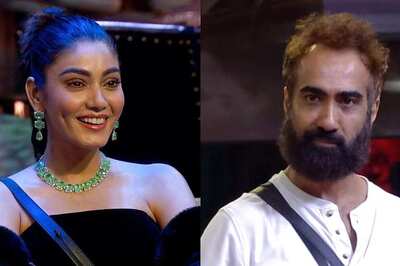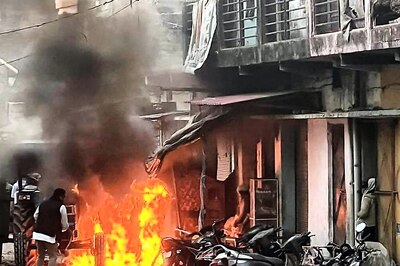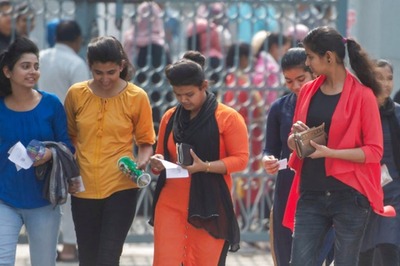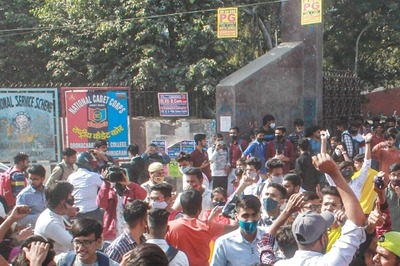
views
On 5 January, Bangladesh National Hindu Grand Alliance tabled its annual report of atrocities on Bangladeshi minorities. It noted various cases of gruesome rapes, murders and conversion of minorities in Bangladesh in the year 2022. According to the general secretary of this organisation, around 90,000 acres of land belonging to the minorities still remain occupied with around 572 families evicted in the span of just a year. Between 2013 and 2021, 3,600 attacks on religious minorities have taken place in Bangladesh.
The story is much worse when we talk about the minorities in Pakistan. Every single day there is a case of a minor Hindu girl forcefully kidnapped, raped and converted while the courts later side with the culprits and don’t even hand over the custody of the child to the family. It’s a mammoth task to prove that the girl is still a child and not an adult to be making her own choice. Case in point is Chanda Maharaj’s plight from Sindh who despite being declared a minor in medical tests was sent to the shelter home and not her family.
Despite all the show on international forums of being a liberal progressive society, countries in the subcontinent are still the worst nightmare for minorities.
Ironically, the constitution of Pakistan mandates equal treatment of citizens irrespective of their religion but in reality, minorities are treated like non-citizens. When young girls aren’t being forced to have sexual relations with their “husbands” after conversion, then someone in their kin is definitely facing fake blasphemy charges to terrorise and subjugate them under the blasphemy law. Though the male members of the minority communities face regular violence, the women folk are doubly marginalised due to their identity as a woman and a minority. According to various estimates, only 2 percent of these women are employed in jobs that require education. Rest survive doing menial jobs as sanitation workers or domestic helps. They even face social ostracisation, videos of which often surface on the social media where popular figures are making fun of Hindu practices with loud applause from the domestic audience.
After Independence, India with utmost conviction chose a secular polity. It even went a step ahead and allowed the Muslims to have their personal law, however, the treatment of women and legal age of marriage under it are a matter of much concern.
But the legal status of Hindus in other parts of the subcontinent paints a sorry picture. Pakistan didn’t even have a legal provision to register Hindu marriages until 2017 when a law was passed in the Pakistani senate. But the law remains only on paper with no implementation on ground except in Sindh province which has its own law on the matter. Other provinces haven’t even drafted the rules under this law. Seventy-five years have passed since Partition but even today certain rights such as divorce, adoption and inheritance evade Hindus of Pakistan.
In Bangladesh, the problem is peculiar because personal matters of Hindus are still governed under the archaic personal laws as mandated during British rule. Today Hindu women can’t seek divorce or a share in property under these laws but their husbands can legally have more than one wife. Despite many protests regarding this, the situation remains unchanged.
Until 2012, there was no law under which Hindus could register their marriage in Bangladesh. Hindus are also discriminated against in terms of property rights as Bangladesh has inherited a controversial vested property law from Pakistan. Under this law, state-mediated deprivation of property rights of Hindus who were termed as “enemies” after the 1965 India-Pakistan war continues unabated even after liberation of Bangladesh in 1971. This law is infamous in the country for grabbing Hindu property and despite amendments in the law to provide for a return of the property, little change is visible on the ground. When not using legal tools to discriminate against Hindus, community leaders often orchestrate attacks on Hindus temples to displace the minorities and take over their property.
Bangladesh’s de-secularisation started with the Zia-ur Rahman government, but it was Hussain Muhammad Ershad who first declared ‘Islam’ as the state religion in 1988. Even the Awami League didn’t change this when it came back to power in 2009. Today, as per the constitution, equal status and rights irrespective of religion are to be ensured by the state in Bangladesh but the state religion still remains Islam. Sheikh Hasina is unlikely to revert the constitution back to its 1972 secular version but to her credit, she has cracked down on the radical Islamists who participated in the genocide of Bengali Hindus in 1971 including the Jamaat-e-Islami. Jamaat members are still arrested for engineering attacks against Hindus, including in the 2021 Durga Puja pandal attacks backed by Pakistan. PM Hasina had accused Pakistan of driving a wedge in the society without naming the country at that time.
Despite clear cases of persecution of Hindus in the neighbouring countries, their road to Indian citizenship is fraught with multiple challenges. Around 800 Pakistani Hindus reportedly left India in 2021 after failing to secure any progress on their citizenship application. Similarly, the much-debated CAA, which provides for a cut-off until 2014, hasn’t seen any progress as the government has yet again sought an extension to notify the governing rules last week.
The author is a PhD in International Relations from the Department of International Relations, South Asian University. Her research focuses on political economy of South Asia and regional integration. The views expressed in this article are those of the author and do not represent the stand of this publication.
Read all the Latest Opinions here




















Comments
0 comment